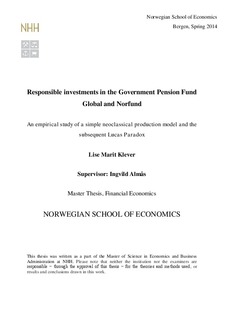Responsible investments in the Government Pension Fund Global and Norfund : An empirical study of a simple neoclassical production model and the subsequent Lucas Paradox
Master thesis
Permanent lenke
http://hdl.handle.net/11250/221691Utgivelsesdato
2014Metadata
Vis full innførselSamlinger
- Master Thesis [4372]
Sammendrag
The Government Pension Fund Global and its investment strategy is widely discussed and criticised by many. Financial institutions solely investing in development projects, like Norfund, have in some studies been identified to outperform traditional profit maximizing investment strategies, like the Government Pension Fund Global.
In this thesis, the return of capital for the Government Pension Fund Global and Norfund are predicted from a simple neoclassical production model and the subsequent Lucas Paradox, and compared to the funds’ actual historical returns. The research does however not provide any significant evidence supporting the funds’ mean of returns to be unequal. Acknowledging the two funds’ return on capital to be statistically equivalent implies that neither the prediction from the simple neoclassical model nor the Lucas Paradox can be observed in the sampled data. Accordingly, the provided empirical analysis does not support the above statement of Norfund outperforming the Government Pension Fund Global.
The further discussion points out limitations regarding human capital, technology and infrastructure and institutions as possible explanations for the differences between the neoclassical predictions and the observed returns.
